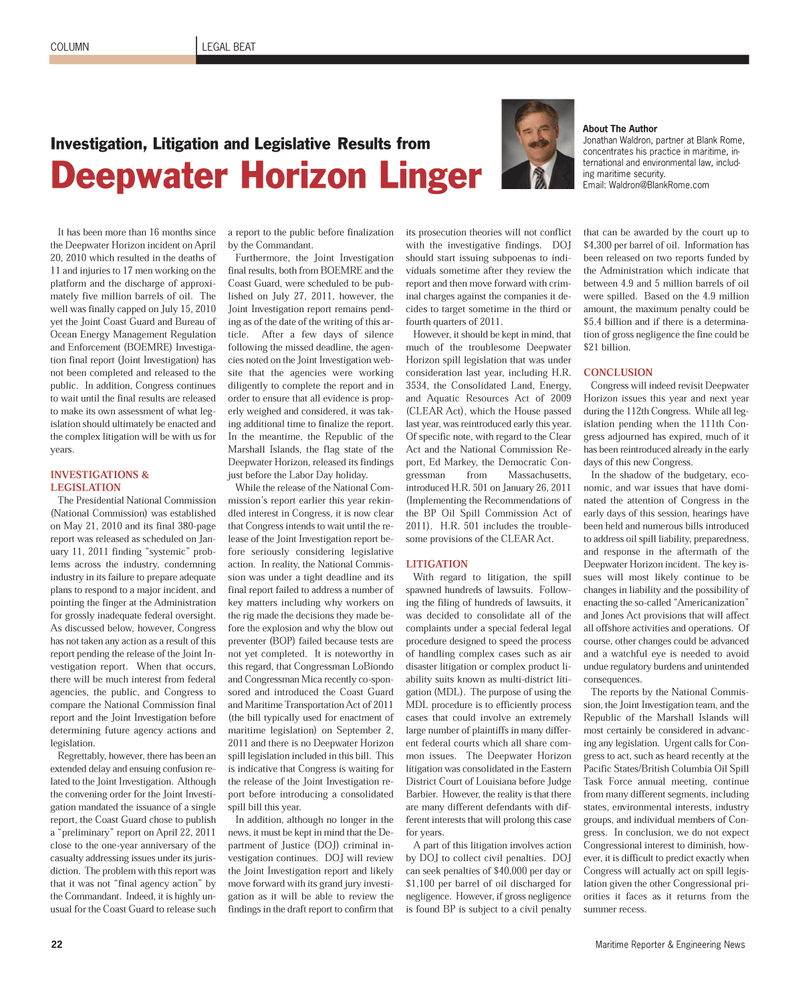
Page 22: of Maritime Reporter Magazine (October 2011)
Marine Design Annual
Read this page in Pdf, Flash or Html5 edition of October 2011 Maritime Reporter Magazine
22Maritime Reporter & Engineering News It has been more than 16 months sincethe Deepwater Horizon incident on April 20, 2010 which resulted in the deaths of11 and injuries to 17 men working on the platform and the discharge of approxi- mately five million barrels of oil. The well was finally capped on July 15, 2010 yet the Joint Coast Guard and Bureau ofOcean Energy Management Regulation and Enforcement (BOEMRE) Investiga- tion final report (Joint Investigation) has not been completed and released to thepublic. In addition, Congress continuesto wait until the final results are released to make its own assessment of what leg- islation should ultimately be enacted andthe complex litigation will be with us for years. INVESTIGATIONS & LEGISLATION The Presidential National Commission(National Commission) was established on May 21, 2010 and its final 380-page report was released as scheduled on Jan- uary 11, 2011 finding ?systemic? prob- lems across the industry, condemning industry in its failure to prepare adequate plans to respond to a major incident, andpointing the finger at the Administration for grossly inadequate federal oversight. As discussed below, however, Congress has not taken any action as a result of this report pending the release of the Joint In-vestigation report. When that occurs, there will be much interest from federalagencies, the public, and Congress tocompare the National Commission final report and the Joint Investigation before determining future agency actions and legislation. Regrettably, however, there has been an extended delay and ensuing confusion re- lated to the Joint Investigation. Although the convening order for the Joint Investi- gation mandated the issuance of a single report, the Coast Guard chose to publisha ?preliminary? report on April 22, 2011 close to the one-year anniversary of the casualty addressing issues under its juris-diction. The problem with this report was that it was not ?final agency action? by the Commandant. Indeed, it is highly un-usual for the Coast Guard to release sucha report to the public before finalization by the Commandant. Furthermore, the Joint Investigation final results, both from BOEMRE and the Coast Guard, were scheduled to be pub-lished on July 27, 2011, however, the Joint Investigation report remains pend- ing as of the date of the writing of this ar- ticle. After a few days of silence following the missed deadline, the agen- cies noted on the Joint Investigation web- site that the agencies were working diligently to complete the report and inorder to ensure that all evidence is prop- erly weighed and considered, it was tak- ing additional time to finalize the report. In the meantime, the Republic of theMarshall Islands, the flag state of theDeepwater Horizon, released its findings just before the Labor Day holiday. While the release of the National Com-mission?s report earlier this year rekin- dled interest in Congress, it is now clear that Congress intends to wait until the re- lease of the Joint Investigation report be- fore seriously considering legislative action. In reality, the National Commis- sion was under a tight deadline and its final report failed to address a number of key matters including why workers on the rig made the decisions they made be- fore the explosion and why the blow out preventer (BOP) failed because tests are not yet completed. It is noteworthy in this regard, that Congressman LoBiondo and Congressman Mica recently co-spon-sored and introduced the Coast Guardand Maritime Transportation Act of 2011 (the bill typically used for enactment ofmaritime legislation) on September 2, 2011 and there is no Deepwater Horizon spill legislation included in this bill. This is indicative that Congress is waiting for the release of the Joint Investigation re- port before introducing a consolidatedspill bill this year. In addition, although no longer in thenews, it must be kept in mind that the De- partment of Justice (DOJ) criminal in-vestigation continues. DOJ will review the Joint Investigation report and likely move forward with its grand jury investi- gation as it will be able to review the findings in the draft report to confirm that its prosecution theories will not conflictwith the investigative findings. DOJ should start issuing subpoenas to indi-viduals sometime after they review the report and then move forward with crim- inal charges against the companies it de- cides to target sometime in the third or fourth quarters of 2011.However, it should be kept in mind, that much of the troublesome Deepwater Horizon spill legislation that was under consideration last year, including H.R. 3534, the Consolidated Land, Energy, and Aquatic Resources Act of 2009 (CLEAR Act), which the House passed last year, was reintroduced early this year. Of specific note, with regard to the Clear Act and the National Commission Re-port, Ed Markey, the Democratic Con- gressman from Massachusetts,introduced H.R. 501 on January 26, 2011(Implementing the Recommendations ofthe BP Oil Spill Commission Act of 2011). H.R. 501 includes the trouble-some provisions of the CLEAR Act. LITIGATION With regard to litigation, the spill spawned hundreds of lawsuits. Follow- ing the filing of hundreds of lawsuits, it was decided to consolidate all of the complaints under a special federal legal procedure designed to speed the processof handling complex cases such as air disaster litigation or complex product li- ability suits known as multi-district liti- gation (MDL). The purpose of using the MDL procedure is to efficiently process cases that could involve an extremely large number of plaintiffs in many differ- ent federal courts which all share com-mon issues. The Deepwater Horizon litigation was consolidated in the Eastern District Court of Louisiana before JudgeBarbier. However, the reality is that there are many different defendants with dif- ferent interests that will prolong this casefor years. A part of this litigation involves action by DOJ to collect civil penalties. DOJ can seek penalties of $40,000 per day or$1,100 per barrel of oil discharged for negligence. However, if gross negligence is found BP is subject to a civil penalty that can be awarded by the court up to $4,300 per barrel of oil. Information hasbeen released on two reports funded by the Administration which indicate that between 4.9 and 5 million barrels of oilwere spilled. Based on the 4.9 millionamount, the maximum penalty could be$5.4 billion and if there is a determina- tion of gross negligence the fine could be $21 billion. CONCLUSIONCongress will indeed revisit Deepwater Horizon issues this year and next year during the 112th Congress. While all leg- islation pending when the 111th Con-gress adjourned has expired, much of it has been reintroduced already in the earlydays of this new Congress. In the shadow of the budgetary, eco- nomic, and war issues that have domi- nated the attention of Congress in theearly days of this session, hearings have been held and numerous bills introducedto address oil spill liability, preparedness, and response in the aftermath of theDeepwater Horizon incident. The key is- sues will most likely continue to be changes in liability and the possibility ofenacting the so-called ?Americanization? and Jones Act provisions that will affect all offshore activities and operations. Of course, other changes could be advanced and a watchful eye is needed to avoid undue regulatory burdens and unintended consequences. The reports by the National Commis-sion, the Joint Investigation team, and the Republic of the Marshall Islands willmost certainly be considered in advanc- ing any legislation. Urgent calls for Con- gress to act, such as heard recently at thePacific States/British Columbia Oil Spill Task Force annual meeting, continue from many different segments, including states, environmental interests, industry groups, and individual members of Con- gress. In conclusion, we do not expect Congressional interest to diminish, how- ever, it is difficult to predict exactly when Congress will actually act on spill legis- lation given the other Congressional pri- orities it faces as it returns from the summer recess.LEGAL BEAT COLUMNInvestigation, Litigation and LegislativeResults from Deepwater Horizon LingerAbout The AuthorJonathan Waldron, partner at Blank Rome, concentrates his practice in maritime, in-ternational and environmental law, includ- ing maritime security. Email: [email protected] MR Oct.11 # 3 (18-24):MR Template 10/5/2011 12:40 PM Page 22

 21
21

 23
23
